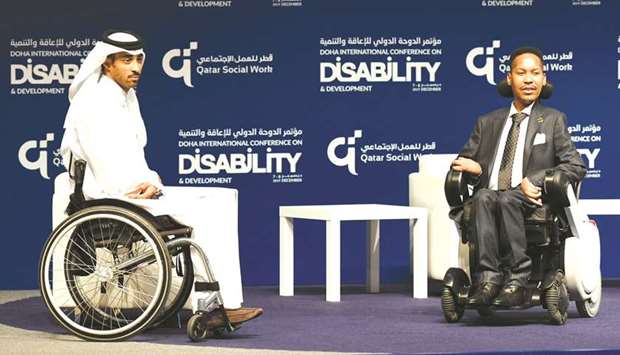The Doha International Disability and Development Conference (DICDD) was inaugurated by Her Highness Sheikha Moza bint Nasser, Founder of Qatar Foundation for Social Work (QFSW) and a global advocate for the UN’s Sustainable Development Goals (SDGs), at the Qatar National Convention Centre yesterday.
The two-day conference, being held under the theme of ‘Leaving no one behind’, has been organised by QFSW in collaboration with local and international partners.
The opening ceremony was attended by Amina J Mohamed, Deputy Secretary-General of the United Nations, HE Sheikha Hind bint Hamad al-Thani, Vice-Chairperson and CEO of Qatar Foundation, Xavier Torres, adviser of the Presidential Government of Ecuador, ministers, a large number of dignitaries and other VIP guests.
More than 1,500 experts, specialists and policy makers from Qatar and around the world are taking part in the conference.
“We must collaborate globally to devise mechanisms to stop the waste in resources caused by the lack of investment and empowerment for people with disabilities and enable them to play active roles in the development of society. We can achieve this through meaningful employment of this large number that has been marginalised for the sake of disability, especially those talented among them,” Sheikha Moza said at the opening ceremony.
Speaking about the need to empower people with disabilities, Mohamed pointed out that stigma faced by persons with disabilities abounds, compounded by a lack of understanding of their rights, and of the value of their contributions to society.
“This situation is untenable. It goes against collective commitment to human dignity, our obligations under international law and the strong business case for disability inclusion. It is up to us – leaders from the government, business, civil society, organisations of persons with disabilities, international organisations and others – to turn this situation around,” she noted.
Amal bin Abdullatif al-Mannai, CEO of QFSW, highlighted the role played by Qatar in supporting people with disabilities.
“Qatar has long advocated for the rights of people with disabilities around the world. In 2006, for example, Qatar supported the UN’s Convention on the Rights of Persons with Disabilities, before signing it in 2008. Qatar has also invested heavily in the knowledge and resources to monitor and evaluate progress towards the SDGs for persons with disabilities. Working closely with the United Nations, we have also adopted the objectives of the 2030 Agenda for Sustainable Development to support persons with disabilities in Qatar and globally,” she explained.
The first day of the conference saw several sessions discussing inclusive equality, education and employment.
DICDD featured several guest speakers from Qatar and abroad on Day 1, who shared their personal stories of living with disabilities. The guest speakers were Kholoud Abu Sharida, Muniba Mezari and Edward Ndopu.
Sharida, a Qatari, recounted her success story in education, and how she overcame all obstacles despite losing her vision from birth. She was able to obtain a masters degree and a job and is currently applying for PhD.
Ndopo, who was given until the age of five to live, narrated how he defied reality and became one of the most influential young people in the world and one of the United Nations ambassadors for sustainable development goals.
Mazari recollected how she overcame from a fatal accident and now a painter, singer, human rights activist and one of the most inspiring speakers in the world.
The Masters of Ceremony, Faisal al-Kohaji and Mohamed al-Faheda, are also persons with disabilities.
There is an accompanying exhibition, showcasing local initiatives, projects and assistive-technologies that are empowering people with disabilities.

Edward Ndopu narrates his story.

